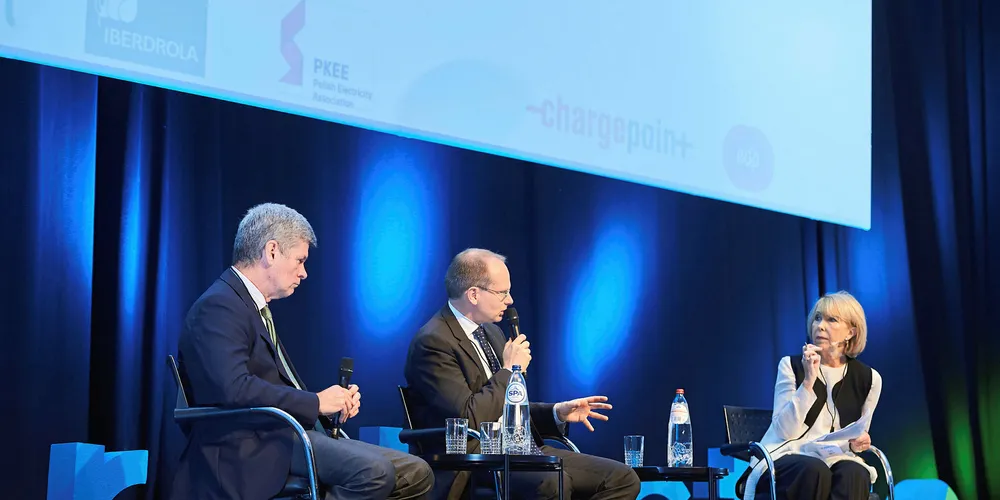Which comes first, the charging points or the electric vehicle?
IN DEPTH | Large-scale deployment of EVs is often cited as a key element of the energy transition, but the charging infrastructure will need subsidies, writes Leigh Collins

With drivers citing the lack of public charging points as one of their two main reasons for not yet buying an electric vehicle (the other being their high price), there seems to be a consensus in the European electricity industry that there needs to be widespread charging infrastructure in place before the scales will start to tip in favour of EVs.
But as there are relatively few EVs currently on the road, such charging networks are unlikely to be profitable for some years. This means that, at least initially, the build-out will have to be subsidised by cities or governments, or even the European Commission — through direct subsidies or grants, or by allowing regulated distribution service operators (DSOs) to increase prices to cover the costs.
“In the beginning, there will have to be subsidies one way or another… to break the chicken and egg,” said Antonio Espinosa, chief executive of Iberdrola Distribution, at the Eurelectric EV conference in Brussels last week.
To help persuade those holding public purse strings to make such investments, EV infrastructure must be seen as a public good, something that society will benefit from — and not just from reducing carbon emissions.
The conference heard that EVs will also reduce vehicle pollution (and therefore the costs of caring for people with associated health problems) and noise levels — both of which will make cities more attractive places to live.
“We need to get into a framework where, yes, the city or the government needs to invest the money [in public charging infrastructure],” said Håkan Agneval, president of Volvo Buses. “Okay, what’s the benefit? Well, it’s less people dying from poor air quality. It’s real-estate values that will go up when there is silence in public transport. It’s only the cities or the government that can reap those benefits, so therefore there is a strong logic for subsidies.
“It’s very easy to prove that EVs represent a significant reduction of CO2, NOx [nitrogen oxide pollutants] and noise. What is more difficult is to make this financial, societal calculation and get acceptance for this. Because we cannot get stuck by comparing, for instance, the price of a diesel bus and the price of an electric bus. Yes, the electric bus is twice the price of the diesel bus. But if you make a life-cycle cost calculation and factor in the environmental and societal benefits, it’s a no-brainer.”
Agneval pointed to the Chinese city of Shenzhen, which announced at the end of last year that all its 16,359 buses were now fully electric. “It’s fantastic and it’s all driven by subsidies,” he said.
“The reason why 95% of the world’s electric buses are in China is because the Chinese government had put in [very generous] subsidies.”
Agneval explained that the reduction or elimination of noise from buses, trams or trains creates “new opportunities for public transport because you can bring public transport much closer to people. Nobody today wants to have a bus depot or even a tram stop outside of their window because of the noise. But if you eliminate the noise, it’s a totally different ball game”.
Increasing the attractiveness and frequency of public transport can also encourage its use, and reduce the number of cars on the road — which in turn will reduce the traffic jams that plague cities like Brussels, and further enhance quality of life.
Pascal Smet, the minister for mobility and public works for Brussels, told the conference that the city government is planning to invest €1bn ($1.15bn) by 2030 on clean public transport, including electric buses and trams, and “transforming our urban highways into urban boulevards”.
“The cities that do that are those that will drive forward economically,” he said.
Smet argued that cars should no longer be seen as offering the freedom they once did, but that encouraging EV sharing schemes was one of the methods to creating a better future.
“The individual car was the biggest mistake that humankind has ever made,” he said, repeating the sentence to make sure that everyone knew he meant it.
“My car is no longer my freedom. My car is my traffic jam. My car is my pollution. My car is noise.
“You get a better quality of life if you get air pollution and noise out of the city.”
The noise reduction experienced during Brussels’ annual car-free Sunday is “amazing”, he added.
(Copyright)